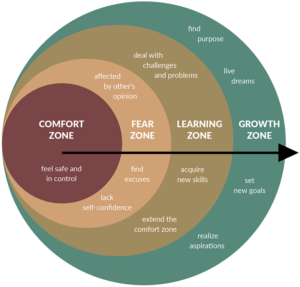The debilitating comfort zone.
It’s a phrase we’ve all heard before. Get out of your comfort zone. It’s one of those key phrases that might seem like it’s lost its impact. Unless, that is, you break down what that comfort zone really is all about. Once you do, you might find that the decision and the courage to step out of it is crucially important in reaching your aspirations.
Here’s another saying you’re probably familiar with. Ignorance is bliss. It may seem sort of harsh, but that kind of goes hand in hand with the concept of the comfort zone. At least when we’re talking about personal and career development. You might not know you’re stuck in the comfort zone, and you might not know how far you need to travel to reach your optimal destination. It may depend on how important you feel it is to change your life.
What does this mean exactly? Well, in your efforts to self-improve, achieve goals, and make career strides, there are several ‘zones’ through which you must progress:
- The comfort zone.
- The fear zone.
- The learning zone.
- The growth zone.
Travelling all the way from the former to the latter is the crucial journey you must take to change your life.
The comfort zone:
The comfort zone is the place you operate from when you’re secure with what you’re doing. Skills you’ve already mastered, free of risk, free of anxiety. Your basic needs are being met. The question is; is that all you want? In the comfort zone, you’re going to feel safe but maybe unchallenged. Your self-talk may include “I’m not good enough, so stay where you are now.”
It’s an anxiety neutral condition, as coined by Judith Bardwick.
To grow, you must leave your comfort zone. Think of it as the enemy.

Image credit to Positive Psychology.
The fear zone:
This is the wall. This is what keeps us in the comfort zone.
In her book, ‘Hello Fears’, Michelle Poler talks about being fearless, fearful, and brave, and it may not be what you think.
She doesn’t give much credit to ‘fearless’ as that’s the easy road, or maybe the reckless one. Having no fears is not real for the most part, or it is simply the lack of common sense.
She talks about ‘fearful’ in the sense that we all have fears, and those that become stuck because of them, never leave the comfort zone – the biggest enemy of progress. Fear is the inhibitor instead of the challenge.
Then she talks about being ‘brave’, being ‘fearful’, facing your fears, picturing your best outcome, driven by you, and taking on new challenges by having faith in yourself. The brave, the courageous, are the victors, the enjoyers of the spoils.
The fear zone is where you find yourself when you first step out of your comfort zone. And, it’s the direct opposite; the place where you will find yourself at your least comfortable. It’s when you’ve decided to consider something new, embrace uncertainty, and walk towards the unknown.
How a person handles being in the fear zone says a lot about them. Because this is the period where you’re most likely to experience self-doubt and be affected by other’s opinions, many will continue to find excuses not to push forward or simply return to their comfort zone. If you can weather this discomfort, you will come out stronger.
The learning zone:
If you can push through the fear zone, addressing challenges, doubts, and concerns, you will find yourself in the learning zone. Here you will combat the obstacles that may have caused roadblocks in the fear zone, thereby acquiring experience, skills, and knowledge to propel you forward. In essence, this stage is critical, and something you should be aiming to experience.
The growth zone:
Finally, when you get through all these other stages, you find yourself having experienced personal growth. In whatever area of your life or career this may be, the process is fundamental to your development.
This is where every person you aspire to be has ended up because they did face their fears and forged through them. They were not fearless. They were brave. They did not run. They considered, and they decided. They decided, this is who I want to be.
When you reach the growth zone, you will find yourself feeling a sense of fulfilled purpose. It’s here that you can conquer objectives, achieve your dreams, and adjust to set new goals going forward.
In conclusion…
Whatever your dream is, it requires purposeful thinking. Decide to step out of your comfort zone, face the hurdles, and climb over them bravely. It may be uncomfortable at first, but the results will change your life.
Abraham Maslow studied the theory of human motivation, and said; “What a man can be, he must be. This ‘need’ (in his Hierarchy of Needs) we may call self-actualization.”


